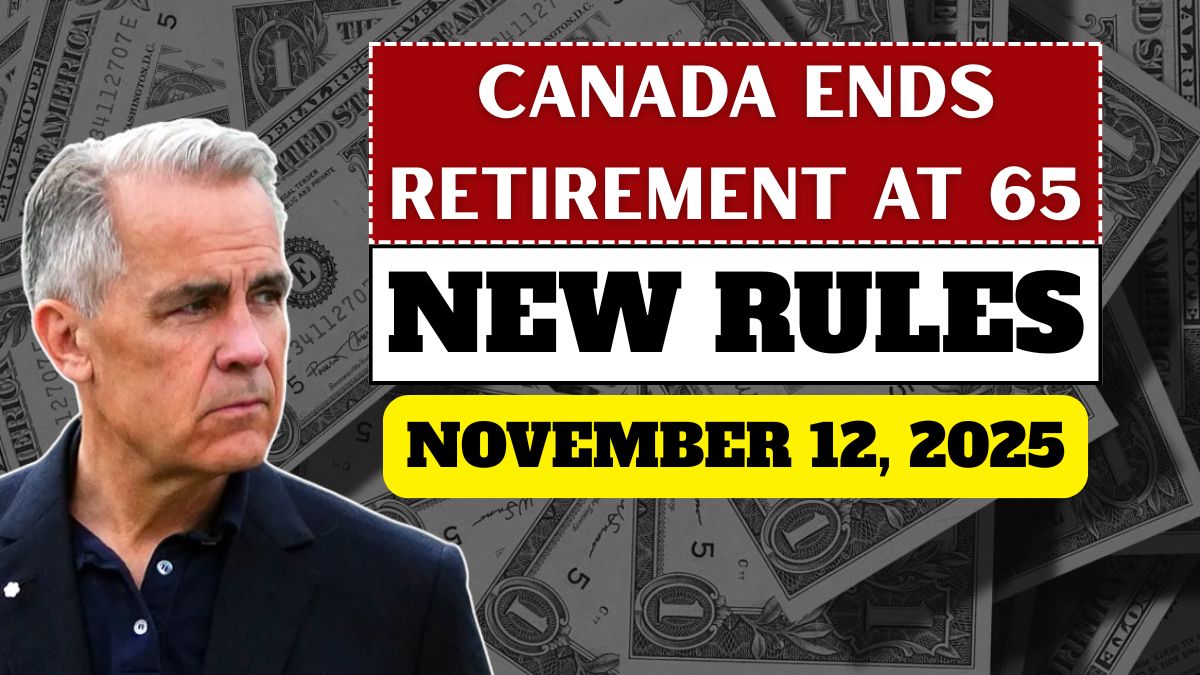Canada is implementing a historic change to its retirement system. Effective November 12, 2025, it will eliminate the traditional retirement age of 65. Retirement will no longer be based on a fixed age but will be entirely determined by individual preferences, financial situation, health, and life goals. This change directly impacts benefits such as the Canada Pension Plan (CPP) and Old Age Security (OAS) and offers a more flexible and personalized retirement system.
This reform is designed to address changing lifestyles, increasing longevity, longer life expectancies, and changing work patterns. Its goal is to empower individuals to plan their own lives and feel more independent about their retirement age.
Major Changes to the Retirement System
For decades, age 65 was considered the standard retirement age in Canada. However, starting November 12, 2025, this restrictive concept will end. Instead, every citizen will be able to decide when they want to retire based on their circumstances. These factors will be key when making a decision:
- Financial preparedness
- Health status
- Personal preferences and goals
- Education and employment needs
Those who choose to retire early will receive lower CPP and OAS payments. Those who continue working longer will receive higher monthly benefits. This way, benefits will depend entirely on the timing of retirement.
This change shifts retirement from being tied to a specific age to a purely personal decision.
What will this impact on CPP and OAS?
Benefits will now be calculated based on when a person decides to retire, not age, as before.
Old system vs. new system
| Aspect | Before | After November 12, 2025 |
|---|---|---|
| CPP Payment | Starts at 65 | Can be taken earlier or later |
| OAS Age | 65 only | Can start early or defer for higher payments |
| Work After 65 | Limited incentives | Extra benefits for working longer |
| How Benefits Are Determined | Based on a fixed age | Based on the individual’s choice |
The new system also strengthens those who wish to work after 65. They can not only earn more but also increase their later retirement benefits.
What does this mean for Canadians?

Whether they’re teachers, doctors, technical experts, or professionals in any field, those who wish to continue working after 65 can now do so without penalty. This will provide them with additional income and stronger financial security.
On the other hand, those who wish to retire early for health or family reasons can also begin retirement earlier, but their monthly amount will be slightly lower. The objective is:
- Personal freedom
- Typical financial planning
- Lifestyle-based choices
Every Canadian will now have complete freedom to make decisions based on their journey and life goals.
Why did the government make this change?
People in Canada are living longer and healthier and want to work beyond 65. Therefore, a fixed retirement age is no longer practical.
This reform is designed to:
- Enhance the long-term stability of the pension system.
- Support seniors who wish to continue working.
- Reduce pressure on pension funds.
- Update the system to accommodate increasing life expectancies.
In short, this reform is in line with today’s economic and social needs.
Additional Support for Disabled Citizens
Along with the retirement reform, the government has also announced a one-time $150 payment to eligible low-income citizens under the Canada Disability Benefit. This amount will be provided to support their living and health needs.
Eligibility and process information is available on the official Government of Canada website.
New Freedoms in Retirement—A New Chapter
Starting November 12, 2025, retirement in Canada will be determined by your wishes and circumstances, not by a fixed rule. This reform provides citizens with greater control, flexibility, and freedom while securing the future of the CPP and OAS.
“Retiring at 65” is becoming a somewhat outdated concept.
It’s time for Canadians to customize their retirement journey—with complete freedom and flexibility.
FAQs
Q. What is changing on November 12, 2025?
A. Canada is ending the fixed retirement age of 65 and allowing flexible retirement based on personal choice.
Q. Can I take CPP earlier than 65 now?
A. Yes. You can take CPP earlier or delay it for higher monthly payments.
Q. Will OAS also become flexible?
A. Yes. OAS can be taken early or deferred for a larger benefit.
Q. Do I get extra benefits if I keep working after 65?
A. Yes. The new rules offer additional incentives for continued work.
Q. Does this change affect everyone?
A. Yes. Anyone planning to retire after November 12, 2025 will fall under the new flexible retirement system.
